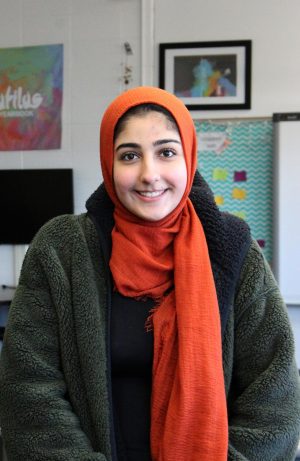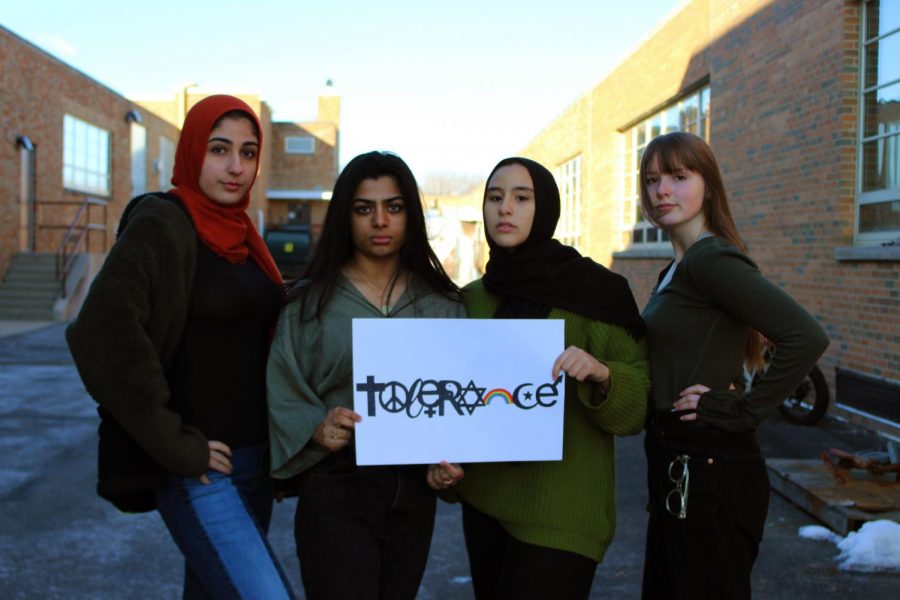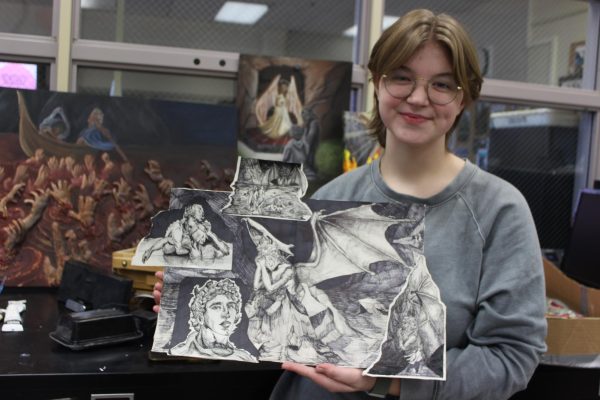Faith vs. Education: The Fight for Eid
Amal Hasan, Zaina Kagzi, Sarah Belabbes, and Emma Bleck spoke in front of the school board recently to bring their attention to the issue of Eid not being a recognized religious holiday in District 128. They continue to fight for this issue, raising awareness and progressing their movement, by working with the school board’s calendar committee.
Winter break, the long stretch of relief built in to the school year, is coordinated around the Christian holiday Christmas. Other Christian holidays like Easter and Good Friday are often built in to spring break. Jewish holidays like Yom Kippur and Rosh Hashanah are non-attendance days for students of all backgrounds. However, the two main holidays of Islam, Eid al-Fitr and Eid al-Adha, are not officially recognized by LHS or District 128. While other students have integrated non-attendance days for their holidays, students who celebrate Eid are faced with a decision: skip school to celebrate and risk getting behind in classes or miss out on family time and traditional festivities.
“Year after year, we’re asked to choose our faith or our education. Are you going to choose to go to school or to celebrate your holiday?” stated junior Amal Hasan, who has recently begun working with administrators in an attempt to make Eid become a non-attendance day for students.
Hasan described how tough the decision is for her every year, and that last year, Eid fell on picture day at school. “I was conflicted, and I was like ‘Do I go to pictures or do I go to my holiday?’ I didn’t want to miss pictures, and I didn’t want to have to get caught up on school work, so I went to picture day,” Hasan described.
Making the decision to come to school or not is not unique to just Muslim students at LHS. Skokie School District 68 is the only district in Illinois to recognize Eid as a non-attendance holiday.
The two Eid holidays, Eid al-Fitr and Eid al-Adha, are celebrated for two different reasons. Eid al-Fitr marks the end of Ramadan, the holy month of fasting. Eid al-Adha celebrates the sacrifices of the Prophet Ibrahim. These are also the only holidays in the religion of Islam, and the dates change yearly depending on the lunar calendar and astronomical predictions. This year, Eid al-Fitr will be celebrated from May 23-24 and Eid al-Adha from July 30-31.
Hasan stated that many members of the Muslim community in Libertyville go to the Libertyville Sports Complex and rent out a space to celebrate for Eid, where they spend time with friends and family, eat traditional food, pray together and exchange gifts. According to Hasan, around 7,000 people came to the Sports Complex for last year’s celebration.
Still, District 128 has yet to recognize Muslim students’ holidays with days off of school.
The fight to see Eid added to the list of non-attendance days was started in 2015 by LHS graduate Mariam Tolba, founder of the Muslim Holiday Coalition, a movement in Lake County that advocates for Eid as a non-attendence day. While her efforts did not result in these non-attendance days, Tolba reached out to Hasan earlier this school year and urged her to continue the mission and “keep the fight going, continue to try to get the day off,” Hasan described.
“When she passed it on to me, I felt so honored. I couldn’t believe that she had thought of me to do that, something that was so important to her. I am so grateful to be the one to keep it going,” said Hasan.

Amal Hasan took control of this movement after LHS alumni Mariam Tolba encouraged her to keep fighting to have Eid recognized. Hasan has since gathered support from many of her peers and succeeded in bringing the issue directly to the school board and calendar committee in hopes of getting Eid off of school in future years.
This year, Hasan and three friends, juniors Sarah Belabbes, Emma Bleck and Zaina Kagzi, spoke about this issue in front of the school board at a public meeting on Jan. 28. Bleck does not celebrate Eid but “was there representing the rest of the student body, and as someone who doesn’t celebrate but does support it, which I think was really effective at bringing in another perspective,” stated Bleck.
Bleck also described that having the day off for a religious holiday is “a privilege that should really be a right. Most students don’t realize that having your holiday off is a privilege because the fact that [Muslim students] don’t have Eid off is often overlooked,” Bleck explained.
Hasan spent months gathering data and statistics about Eid for her presentation, which she worked on from November to January. She explained that her argument was mainly centered around “the [district’s] DARING Mission … and I spun it around. [The mission is] supposed to be raising awareness on racial discrimination, promoting global standards and inclusivity, and I basically said ‘now, you follow it.’”
Hasan also met with district superintendent Dr. Prentiss Lea, LHS Principal Dr. Tom Koulentes and Jon Guillaume, the principal of Vernon Hills High School, in the months leading up to the board meeting.
“There were a lot of road bumps,” stated Hasan. She explained that they asked to be put on the board’s meeting agenda, meaning that they would have unlimited time to speak, and they would be able to have their presentation shown behind them. Instead, the board told Hasan that she would have to give her presentation in the public comments section at the very start of the meeting, which meant that she and her peers each had three to four minutes to speak. “This was the most frustrating part of the whole thing,” noted Hasan.
From here, the group had to work on condensing their presentation. They also began meeting with social studies teacher and debate coach Ms. Sarah Greenswag and Mr. Kevin O’Neill, social studies teacher and Muslim Student Association club sponsor to fine-tune their presentation.
In the weeks leading up to the board meeting, the girls used social media to spread awareness about their cause and to urge people to come support them.
“We weren’t really expecting that many people to come, but when we got there… just the sheer number of people in the room was amazing. I mean, literally every seat was filled, there were people standing, just lining the room. It was amazing,” Bleck described.
Belabbes commented on how “comforting [it is] to know that this community is supporting us by being there at the meeting and by working with us to get the day off. It just shows us how many people stand with us.”
Kagzi emphasized that when she was speaking, she “was so nervous and I was shaking, but that adrenaline made me feel so powerful, and they were finally listening to my story. For the first time, I felt like I had a voice or a say at this school.”
Senior Catherine Corliss, one of the student board representatives who attended the board meeting that night, stated that “hearing them speak at the board meeting was incredible. Their presentation was so well put together and each of their speeches was really impactful. I got literal chills listening to them talk.”
Ms. Greenswag and Mr. O’Neill both attended the meeting as well. Ms. Greenswag noted that it was “the proudest moment I’ve had as a teacher. It’s one of those weird role-reversals where like you feel like you’re learning more from the kids than you’re teaching them. It was amazingly inspirational, and as a history teacher, seeing your students actually make history is just indescribable.”
“Being a Muslim has always been hard,” Kagzi stated, “because you’re considered different, but being able to represent your religion and make a change happen, that’s special.”
After the presentation was over, the group was unsure whether or not the board would respond right away to their concerns, as they typically wait to respond since everything said at the meetings is a matter of public record.
However, the school board did respond to their argument.
Hasan explained that the school board’s response was that they “were open to looking into it more and that they’d never seen it like this. They said that we could try to get it going and make it work with the school’s calendar, which was very surprising, and I felt so grateful,” Hasan explained.
“Everyone should have their holiday be recognized and have that day off for them. There should be no strings attached to celebrating your religion with your family, and it’s especially hard when you don’t have the same privilege that others do,” Belabbes described.
On Feb. 24, Hasan met with the district’s Calendar Committee, which plans out the school’s calendar each year. At the meeting, Hasan repitched the idea to the committee, and while students will not be given the day off for Eid this spring, it is a possibility that Eid will be a non-attendance day in future years.







